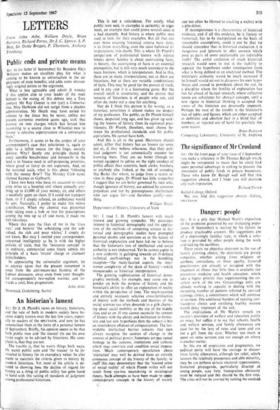Public ends and private means
LETTERS
From John Ashe, William. Doyle, Brian Burrows, Richard -Portes, Dr I. C. Spence, S. P. Best, Sir Denis 'Brogan, P. Thomson, Anthony Froshaug.
Sir; In his letter (I' September) Sir Brandon Rhys Williams makes an excellent plea for what is coming to be known- as universalism in the de- ployment of state benefits; and adds some interest- ingly original points to the argument.
What is less agreeable and adroit (I wonder if this applies also to your leader of the week before) is the easing of this debate into a Tory context Mr Ray Gunter is not (yet) a Conserva- tive. Miss Herbison did not resign from a shadow administration. Mr Heath may have nailed his colours to the fence but he never, unlike our present economic overlord aeons ago, took that posture on NHS charges which has forced him (according to a source close to Wilsonia) now to favour 'a selective superstructure on a universalist basis.'
Furthermore, it seems to be the corpus of your correspondent's case that selectivism is, again to refer to a leftist source for the lingo, socially divisive. Why? Surely one principle shared by every sensible breadwinner and housewife in the land is to finance need in self-proposing priorities, where greed or fancy do not supervene. And, on the national scale, what is this about 'tinkering with the money flow'? The Monday Club never claimed Keynes or Galbraith.
I have two boys who have on occasion to travel sixty miles to a hospital unit where annually any- thing up to f1,000 of your money, sir, and others is needfully spent on them. If I could not transport them, or if I simply refused, an ambulance would be sent. Naturally, I prefer to make this minor contribution. When my chemist was prevented from taking even a bob or two for. prescriptions costing the tots up to f5 and more, it made me feel ridiculous.
Where this puts -the likes of me in the 'class war,' and betwixt 'the subsidising and the sub- sidised, the rich and poor whites,' I simply do not know. But may I remind your correspondent, concerned intelligently as he is with the higher policies of state, that the 'insurance concept' in its ordinary, commercial sense freely admits the principle of a basic 'excess' charge' to claimant • policyholders.
In appreciating the universalist argument, let us anyway agree that the present movement is away from the anti-means-test hysteria of the Labour dinosaurs, away even from your thought- ful correspondent's two-nation worries, and to- wards a cool, blue pragmatism.






























 Previous page
Previous page